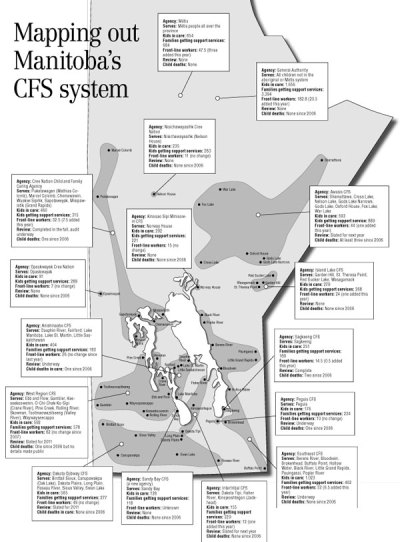Rising from the ashes of Phoenix
Phoenix’s killers appeal
2 minute read Tuesday, Oct. 13, 2009A Manitoba couple found guilty of killing the woman's young daughter will argue today their conviction should be reduced to manslaughter.
In separate briefs filed with the Manitoba Court of Appeal, Samantha Kematch and Karl McKay argue they were unfairly convicted of first-degree murder. Their appeal begins today in Winnipeg.
They point out they denied during their trial that they confined five-year-old Phoenix Sinclair to a basement where she died on the cold floor after the last of many beatings.
Under the Criminal Code, someone is deemed to have committed first-degree murder instead of second-degree murder or manslaughter if he or she forcibly confined the victim at the time of the slaying.
Advertisement
Wish lists from the front line: band chief
2 minute read Preview Sunday, Dec. 21, 2008Phoenix’s legacy takes shape
4 minute read Preview Sunday, Dec. 21, 2008Wish lists from the front line: Children’s advocate
2 minute read Preview Sunday, Dec. 21, 2008Wish lists from the front line: Medical examiner
2 minute read Preview Sunday, Dec. 21, 2008System overhauled, but the deaths continue
6 minute read Sunday, Dec. 21, 2008Before five-year-old Phoenix Sinclair's body was discovered in March 2006 and the horrors of her abuse and torture spotlighted a child-welfare system in crisis, 145 kids in care had died, according to a provincial report, since devolution began in 2003.
Problems, prescriptions and progress
8 minute read Sunday, Dec. 21, 2008There's been a flurry of fixes to the child-welfare system since Phoenix Sinclair's death. They come under the umbrella of Changes for Children, and they come with a hefty $42-million price tag.
But what's really changed in the child-welfare system since March 2006?
Child safety
Province hopes to import success from Minnesota
3 minute read Preview Sunday, Dec. 21, 2008Coming in ’09: A new approach
2 minute read Sunday, Dec. 21, 2008GET ready for next year's child-welfare catch phrase: Differential response.
That's social work-speak for programs and specialized staff that gently weasel their way into troubled families and prevent abuse and neglect before it happens. The goal is to keep families together rather than sending kids to foster homes.
It represents a fundamental shift in the way child welfare is done, and it will mean another 50 or 60 new front-line workers will be hired, say provincial officials.
Two agencies are testing differential response, also known as family enhancement or family support. One agency is testing a new made-in-Manitoba risk-assessment tool that has prevention built into it. It works for families whose risk levels might not trigger foster placement but could benefit from counselling, regular visits from social workers and perhaps some fetal-alcohol services.
Mapping out Manitoba’s CFS system
4 minute read Preview Sunday, Dec. 21, 2008LOAD MORE







